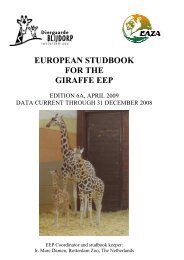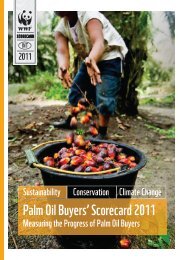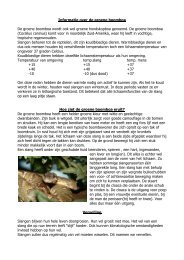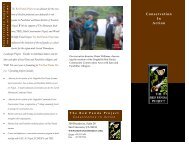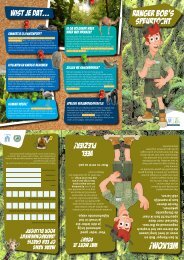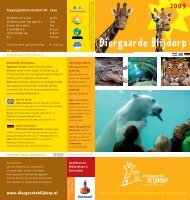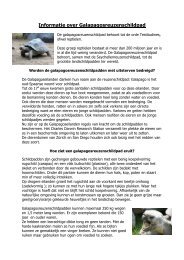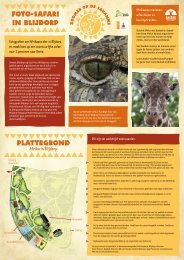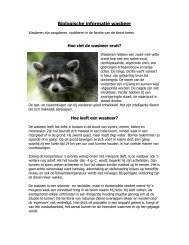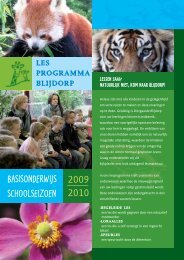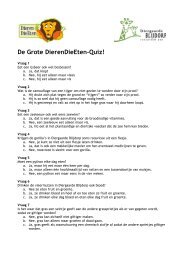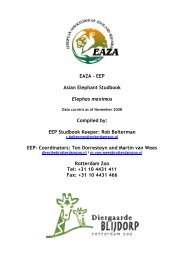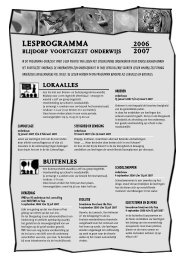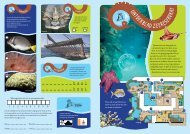Create successful ePaper yourself
Turn your PDF publications into a flip-book with our unique Google optimized e-Paper software.
<strong>EEP</strong> STUDBOOK CROWNED PIGEONS<br />
Residents of the Lakekamu Basin<br />
There are four groups of people living in the Lakekamu Basin: the Biaru, the Kurija, the<br />
Kamea and the Kovio. They will be described shortly.<br />
The Biaru live in several villages north of Kakoro, on the west side of the Biaru River. These<br />
settlements are Kakoro village, Amamas Camp, Poian Camp and Meri Camp. The Biaru own<br />
the land in the mountains Northeast of Kakoro. They also claim the land from the east side of<br />
the Biaru River to the Avi Avi River in the west, but the Kamea do not agree with that.<br />
Both groups probably made intermittent use of the resources of the area between the Biaru<br />
and Avi Avi Rivers, although neither group has settled here. The Biaru also claim that the<br />
land along the Sii and Nagore Rivers, south of Kakoro, belongs to them, although both the<br />
Kurija and the Kovio dispute the assertion. The Biaru argue that the Kurija have no land<br />
rights in the area, claiming that they only recently moved into the basin from the headwaters<br />
of the Kunimaipa River, a distance of several days walk. At issue is the timing of the Kurija<br />
migration into the lowlands. In contrast, the Biaru acknowledge the presence of the Kovio,<br />
with whom they had long-standing trade relations.<br />
The lowland-Biaru occupies an important position in the regional exchange system in the<br />
Lakekamu Basin. In the past, they had regular trade relations with the Kovio, who controlled<br />
the exchange between the coast and the highlands (Hau'ofa, 1981). This was an important<br />
route for shell valuables central to the exchange economies of the highlands. The shell were<br />
obtained form the coast and from lowland mangrove forests. They were traded from the south<br />
through the Lakekamu Basin, becoming increasingly valuable with their distance from their<br />
source. In return for the shell, the Biaru traded bird feathers, bark cloth and spears to the<br />
Kovio. From the mountain Biaru, they acquired pigs and quarried stone used for axe blades.<br />
Shells were central to Biaru exchange and for decades they used them like money, also for<br />
bridewealth payments.<br />
The Kurija are the most western group of the Kunimaipa, who live in the mountains of<br />
Goilala sub-district in Central province (Hallpike, 1977). They consists of nine lineages, who<br />
live separated but join each other when necessary (e.g. to fight). Kunimaipa lineages are<br />
exogameous and after marriage the couple resides patrilocally. Both sides of the family are<br />
expected to make small gifts of dog's teeth and bird of paradise feathers, but until recently, no<br />
large exchange of wealth was associated with marriage. Today bridewealth payments of K500<br />
to K 2000 are usually expected.<br />
The Kurija used to live in the lowlands between the Kunimaipa, Sii and Nagore rivers for<br />
over a hundred years (Kirsch, 1997). They claim the land between the Biaru and Kunimaipa<br />
Rivers, including the territory between the Sii and Nagore rivers. They confirm the Biaru<br />
assertion that the two groups did not have contact until recent years ago, although they claim<br />
that the Biaru River is the Border between the two groups. Like the Biaru, the Kurija deny<br />
having had any contact with the Kamea before the colonial period, or having ventured into<br />
their territory. They traded regularly with the Kovio, sometimes learning to speak their<br />
language, although the two groups did not intermarry. The Kurija did not understand the<br />
languages of either the Kamea of the Biaru.<br />
129



